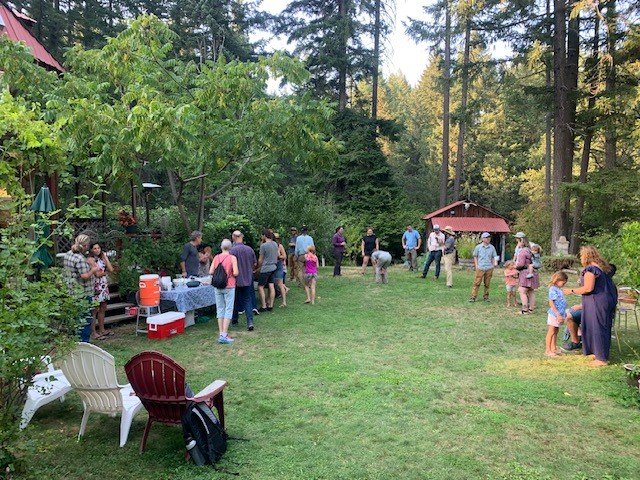Crop Talks Celebrate Local Farms
Through this year’s Crop Talk tours, local farmers and gardeners can learn from each other’s triumphs and challenges, sharing ideas about everything from marketing to soil health across the Gorge.
Gorge Grown instituted Crop Talks several years ago, and now runs them in partnership with Underwood Conservation District, with an average of six tours yearly.
The informal networking events highlight a variety of places — usually smaller market gardens, vineyards and orchards, and meat and dairy operations — in at least four counties on both sides of the Columbia, according to Tova Tillinghast, district director of UCD.
“It’s great to just kind of cross-pollinate. They can compare how things grow in the east end of the Gorge versus the west end,” she said.
As a crowd of about 30 local farmers and growers toured The Gathering farm near Husum on Aug. 24, talk turned to seeding equipment, growing and cooking tips, low-cost solutions for small growers, and pest control: Everything from aphid infestation (set Google calendar alerts for aphid-smashing tasks) to the merits of ducks versus midnight hunting sessions for controlling slugs.
This is The Gathering’s second season as a market garden. On three small plots of clay soil in a slanted coniferous forest, Shruti and Jacob Larson tend an estimated 1/3 acre of herbs and vegetables. They do a lot of gleaning from local fruit and vegetable farms, harvest their own crops, sell both at the White Salmon Farmers’ Market, and breed a few Highland cows, Shruti Larson said.
Those attending the Aug. 24 Crop Talk at The Gathering farm near Husum talked seeding equipment, growing and cooking tips, low-cost solutions for small growers, and pest control. Pictured is farmer Shruti Larson.
Crop Talks help local farmers and growers like the Larsons get acquainted and trade knowledge, space and resources. “The real benefit ... is that we get seasoned farmers visiting,” said Shruti Larson. “I think there’s just a real sharing of knowledge and green wisdom. And good food!”
She learned that, interestingly, other more seasoned farmers used the same kinds of tools the Larsons borrow from the UCD Farm Tool Library.
Crop Talks are half to get together and chat, and half to learn, said Finley Tevlin of Tumbleweed Farm, Parkdale. “It’s interesting to see how people do things at different scales,” he noted. “It’s amazing what people can do with just an acre or less.”
Indeed, the Larsons grow about 20 different varieties. “That’s how you have good soil, is having a diversity of species,” Shruti Larson said, although getting familiar with so many crops is challenging: “Chickens have eaten well here, as we’ve learned!”
And the key to good soil is providing for the microbes in their slanted, forested clay plots, she said. “It’s amazing how much food you can get out ... if you’re taking care of the soil,” she explained later. Some of their soils cannot yet grow a full-size carrot, resulting in “cute dwarfy rainbow carrots” that customers loved. The shade garden, once used to feed cows, is more fertile and grows salad: Greens like brassica, lettuce, arugula and cilantro, which benefit from shade. The sun garden and greenhouse foster flowers and vegetables like tomatoes, onions, Japanese eggplants and Thai basil.
“I think I’ve gotten a degree in market gardening just by doing it,” Shruti Larson remarked. Thanks in part to community programs like Crop Talks, “It is a very community-supported thing.”
More information about Crop Talks is available at www.ucdwa.org/current-news/2023-crop-talks. The final tour is scheduled for Sept. 28, with a Farmers’ Social on Oct. 26.
Each Crop Talk usually has a delicious potluck included with it.

